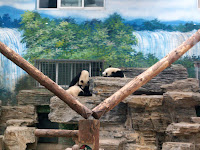So, our next outing was to see the Pandas at the Beijing Zoo.
On the way we happened to be following a truck with little windows in the back. Some people thought that they looked like prisoners, but according to our guides they were workers being transported to a job. They say there is a lot of forced labor in China so who knows. The men seemed to be in good spirits, they smiled and waved to us.
Joan, one of our guides prepped us for our visit to the Pandas and discussed points of interest along the way.
We entered the Panda exhibit.
The first thing we came across was a huge collection of ceramic pandas that school children had painted.
Well, of course, we all had to pose take our photo with the menagerie.
The giant panda, or panda (Ailuropoda melanoleuca, literally meaning "black and white cat-foot") is a bear native to central-western and south western China. It is easily recognized by its large, distinctive black patches around the eyes, over the ears, and across its round body. Though it belongs to the order Carnivora, the panda's diet is 99% bamboo. Pandas in the wild will occasionally eat other grasses, wild tubers, or even meat in the form of birds, rodents or carrion. In captivity they may receive honey, eggs, fish, yams, shrub leaves, oranges, or bananas along with specially prepared feed.
 The giant panda lives in a few mountain ranges in central China, mainly in Sichuan province, but also in the Shaanxi and Gansu provinces. Due to farming, deforestation and other development, the panda has been driven out of the lowland areas where it once lived.
The giant panda lives in a few mountain ranges in central China, mainly in Sichuan province, but also in the Shaanxi and Gansu provinces. Due to farming, deforestation and other development, the panda has been driven out of the lowland areas where it once lived.The panda is a conservation reliant endangered species. A 2007 report shows 239 pandas living in captivity inside China and another 27 outside the country. Wild population estimates vary; one estimate shows that there are about 1,590 individuals living in the wild, while a 2006 study via DNA analysis estimated that this figure could be as high as 2,000 to 3,000. Some reports also show that the number of pandas in the wild is on the rise. However, the IUCN does not believe there is enough certainty yet to reclassify the species from Endangered to Vulnerable.
While the dragon has historically served as China's national emblem, in recent decades the panda has also served as an emblem for the country. Its image appears on a large number of modern Chinese commemorative silver, gold, and platinum coins. Though the panda is often assumed to be docile, it has been known to attack humans, presumably out of irritation rather than predation.
For more photos of Pandas, click here.
Our first sighting of real Pandas was inside of the Panda habitat, in fairly small cages. It reminded me of and old zoo from when I was a child. Sterile, stark, dark and not a very inviting place if you are a Panda.
We were directed into a second building where we could buy souvenirs, of course, before arriving at the next venue.
In this building the enclosures became a little more inviting, more open, lighter and more spacious.

Next, we moved outside to the open air habitats.
In the second area they were...well, they were enjoying their bamboo.
Dee Anna got all artsy taking black and white photos. Only thing is, she didn't know she was doing it at the time.
This habitat was very roomy and the Pandas were quite active running around playing with each other and climbing trees.
Including (although not a Beijinger) Dian Thomas, you may remember her from the Today Show on NBC.
We saw a few other animals as well, some monkeys and birds for example.
For more pictures from the Beijing Zoo, click here.
Next up: The Olympic venues.





































































































great pictures. what an amazing adventure you had.
ReplyDelete